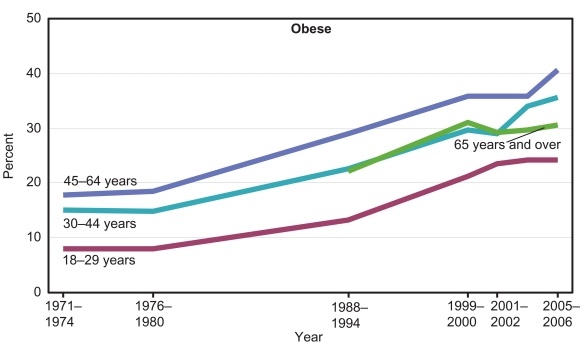NOTE: Shou-Ching and I will be traveling in Europe next week; she’ll be speaking at this meeting and we’ll take a few days vacation. Blogging will resume on October 2 or so.
A New York Times column, “For Weight Loss, Less Exercise May Be More,” got some attention this week. It was based on a recent study of the effects of exercise on weight loss.
The Danish study [1] found that exercise is helpful for weight loss – but only the first 30 minutes of light exercise per day. Additional exercise had no effect on body weight – in fact it even seemed to diminish weight loss. Those who jogged for 60 minutes a day lost five pounds, those who jogged for 30 minutes lost seven.
The subjects wore activity tracking devices – Actigraph GT1-M devices, which are an older model of these and similar to a Fitbit – which produced a surprising result. Those who exercised 30 minutes a day were seemingly energized by their exercise, as they became more active in their daily lives – more likely to take the stairs, for instance. Those who exercised 60 minutes a day, on the other hand, seemed to be worn down by their exercise, and became less active in daily life.
It seems that 30 minutes of exercise improved health but 60 minutes of exercise may have diminished well-being. When it comes to exercise, perhaps, less is more.
A Well-Supported Result
While the Danish study [1] was novel in looking at how weight loss and non-exercise activity respond to exercise, it is not the first study to show that light activity may be healthier than intense activity.
In the new Scribner edition of our book, we greatly expand the part which discusses how to optimize immunity and heal or prevent disease. The new edition discusses exercise. We found a number of recent studies showing that light daily activity is as good or better than intense activity for health:
- A study of American runners found that those who ran between 1 and 20 miles per week at a jogger’s pace of 10 or 11 minutes per mile reduced their risk of dying as much as those who ran more than 20 miles a week or who ran faster. [2]
- Another Danish study reported that Danes who exercised two or three times per week for a total of one to two and a half hours reduced mortality by 44% and extended their lifespans by 6.2 years for men and 5.6 years for women. Those who exercised either more or less had less benefit. [3]
- A study of 416,175 Taiwanese adults found that an hour and a half of moderate exercise per week (13 minutes per day) reduced mortality by 14% and extended lifespan by 3 years. An additional 15 minutes per day reduced mortality by only another 4%. Benefits peaked at 50 minutes of exercise per day. [4]
These are intriguing results. What’s more intriguing is that it doesn’t seem to matter how fit the exerciser is. People gain substantial health benefits from light exercise, even if the activity never makes them fit.
An Evolutionary Argument for Not Over-Exercising
Thanks to Stephan Guyenet, we’ve been talking a lot about the reward system of the human brain. It evolved in order to make us want to do healthy things, like braving the stings of angry bees to get honey from hives concealed high in trees.
David recently linked to an interesting post suggesting that our Paleolithic ancestors may have done a lot of honey gathering, which reminds me of this movie about the Hadza and their honey seeking:
Why did we develop an attractive taste for sugar, and why does the brain reward us for carb consumption? Presumably because the Paleolithic diet was too low in carbs for optimal health, and evolution wanted to encourage Paleolithic hunter-gatherers to gather more honey.
But, however valuable carbs are, it’s not clear that they are as valuable as the extra six years of life we obtain from light daily exercise. Yet there’s no innate reward for exercise. Many people are quite content to live their whole lives as couch potatoes.
Why didn’t evolution reward exercise, if it is as valuable as carbs? Probably because Paleolithic humans almost invariably got more exercise than they needed. Perhaps our brain evolved to prevent our ancestors from over-exercising, and now our brain unfortunately rewards us for over-resting!
Conclusion
It looks like exercise is healthful, but most or all of the benefits come from a relatively small amount – the first 30 minutes per day.
Doing the research for the new edition of our book has led me to revise my ideas of why exercise is beneficial, and how we should exercise to optimize health. In my next post, I’ll discuss why I think light exercise is most healthful, the tension between healthfulness and fitness, what I think a health-oriented exercise program should look like, and how my personal exercise activity has changed.
References
[1] Rosenkilde M et al. Body fat loss and compensatory mechanisms in response to different doses of aerobic exercise–a randomized controlled trial in overweight sedentary males. Am J Physiol Regul Integr Comp Physiol. 2012 Sep;303(6):R571-9. http://pmid.us/22855277.
[2] Gretchen Reynolds, “Moderation as the Sweet Spot for Exercise,” New York Times, June 6, 2012, http://well.blogs.nytimes.com/2012/06/06/moderation-as-the-sweet-spot-for-exercise/.
[3] European Society of Cardiology (ESC) (2012, May 3). Regular jogging shows dramatic increase in life expectancy. ScienceDaily. http://www.sciencedaily.com/releases/2012/05/120503104327.htm.
[4] Wen CP et al. Minimum amount of physical activity for reduced mortality and extended life expectancy: a prospective cohort study. Lancet. 2011 Oct 1;378(9798):1244-53. http://pmid.us/21846575.















Recent Comments